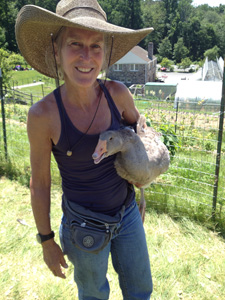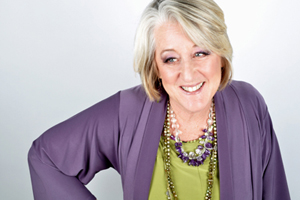If the Muse is Kind: Linda Rogers in Conversation with Maggie Schwed

Maggie Schwed's "The Constant Gardener" was one of two winners of our 2011 Long Poem Prize. Malahat advisory board member Linda Rogers spoke with her about life post-win.
"The Constant Gardener" is such a complete poem, and given that poets often have one poem they measure by, I wonder if you feel as Homer might have felt: well, that was the journey, the rest is cadenza. Where have you gone since grief, given that every poem is about loss, even if it is just the passing of something beautiful, like music. What is moving you to write now?
Yes, grief and lament were very much the mode of “The Constant Gardener” – of the whole manuscript of which it is the central poem, really. In the years I was working on that manuscript, called “A Simple Hunger,” I had been teaching The Odyssey fairly often, to high school students. I still felt close to Homer when I began to write about the Hudson Valley countryside I was coming to know, and about my own garden, so somehow Homer leeched into the work and made it larger. In the past six or seven years, I have been working part-time for a farm, in the fields and greenhouses, but mostly with livestock. My second manuscript, Driving for the Bees, has been accepted for publication by Black Lawrence Press, and will appear in the spring of 2014. It’s largely, but not exclusively, about things I’ve been able to see and get close to by farming.
When teaching, I recommend reading in all genres and living life to the fullest. I have had students come back and tell me my advice led to the creation of a poem or a child. What would you say to the prescription (short of the urban/rural reversal that sent unskilled intelligentsia in China to farms during the cultural revolution) that all writers should spend time in real life, gardening and animal husbandry? When I think of the most amazing images, I see your deer along with Ted Hughes’ little fox, and the lambs of course. Would you be the writer you are if you had skipped the rural life?
I acknowledge, with a degree of disappointment (or maybe it’s incredulity?), that gardening and animal husbandry are not for everyone – they’re not for my urban husband, for example. He loves nature but would just as soon never muck out a barn. Being closely involved with rural life is good for me, though, for my spirit and imagination. The whole business of working with growth, birth, and death, of being actively part of each season, of using the weather and being out in it with pressing things to do, of strengthening my body, of problem-solving and tending plants and animals, offers a pleasure unlike any other kind of work I’ve done. My immersion in farming is a little irregular. I live in New York City and commute to the farm and its engulfing concerns, then return to city life. I do think that work that allows a very concrete, even visceral, range of experiences, physical skills, surprising details, and special vocabulary is good for writers—Moby Dick comes to mind. The physical world is a good path toward the abstract – I think it’s harder going the other way round, from abstract to concrete. At the same time, details are only details until they are transformed, and that is a very different kind of undertaking, solitary and often slow. Which work do I prefer, farming or writing? There, I can’t choose. Writing is essential to my sense of myself; farming is a labour I like doing and thinking about.
Between reading Virgil’s Georgics and Michael Pollan’s Omnivore’s Dilemma, I got drawn into farming partly because I thought there was a lot of knowledge that was being lost, about how to understand what a particular piece of land can do, and then all the things a farmer needs to learn in order to do it. I also love the appearance of cultivated land; it’s more moving to me than wilderness. As a poet, I have the feeling that there is a kind of hunger in us for colour, for the natural world, for wild turkeys in the woods and the names of pasture grasses and how a creek looks with October leaves in it. Other poets, trying not to write endlessly about themselves, turn outward and sink themselves in nonfiction, books about salt or dirt or optics, or history. I admit to suffering from a worry that the general category of nature poems is somehow…rear guard. And, anticipating one of your later questions, that the writing of nature poems is perhaps understood to be a female penchant, Ted Hughes and Seamus Heaney to the contrary notwithstanding. In other words, I’m insecure about what I do, but I find I don’t have much of a choice. What I can see (a very strong sense for me), smell, taste, touch – which farming and digging in a garden bring me – gives me the urge to try to find words and rhythms to hold it, to examine it, to reflect on it. No, I wouldn’t be the writer I am without the opportunity to experience rural life in all the seasons.
I understand that you are a mature writer who has given her early years to nurturing - child raising and teaching. Do you find there is an advantage or disadvantage in waiting to attend your muse? Do readers, editors, and publishers respect the mature feminine perspective or do you sometimes feel a certain condescension, that poetry is one hobby option for middle-aged women?
Sometimes long poems and or prose poems announce a segue to a new genre. Does the larger canvas of fiction call you or has poetry remained paramount in your consciousness?
To combine my answer to your last two questions, I never felt poetry was an option peculiar to middle-aged women, though I notice that plenty of first books of poems are not written by young poets. I began by writing a novel (unpublished) and then shifted into poetry, or, better, returned to it. I’d studied with Jane Cooper at Sarah Lawrence, then Jean Valentine, Robert Lowell, and Elizabeth Bishop after college. I went to graduate school at the University of Chicago in my mid-twenties and that shut me up for quite a while. The novel came when my second child was crawling around on the floor, in my early thirties. Now I’m 61. I never have an easy time with the muse. I’m either writing or not writing, and the not-writing intervals can be very long and nerve wracking. I haven’t felt patronized, ever, unless someone tries to call a female poet a poetess. I’ve only experienced encouragement from editors and publishers, even if they rejected my work. My own horror at the thought of poetry as a hobby, or having my work deemed a hobby, was helped considerably by having Driving to the Bees heading into print.
As to ongoing work, I would like to work on another sustained sequence and maybe in the middle of one, returning to Homer, oddly enough. It has its roots in a tiny story about Hephaistos, the blacksmith artist who is unique among the gods in being deformed, and his unfaithful wife Aphrodite. I’m moving back and forth between the two characters, letting them have their say, but they also disappear along with the archaic world and it’s sometimes about marriage, sometimes about desire... We’ll see.
I love fiction, but yes, poetry remains paramount. Fiction teaches me things about handling time, multiple voices, elliptical narrative. Elements like these continue to serve me well in poetry. Perhaps one day, things I’ve learned from writing poems will enlarge fiction for me.
Your poetry is strong in imagery and music. Are these disciplines that you have actively pursued or are they incidental in your life?
I can’t draw worth beans, if that what you mean by pursuing imagery as a discipline. I do sing. I even take lessons. But as to music in poetry, I work endlessly out loud.
A male reviewer might say you have a masculine facility with verbs as muscle. Phrases like "Pestering the bowl" and "spiders folded up like deck chairs" stick in the mind, but then we have the deer "swishing through ferns" and "he plucks last weeds from the soil like threads from an elegant gown," which could only have been written by a woman. Do you regard a gender balance in perspective to be one of your strengths?
I haven’t thought much about masculine/feminine, though I’m aware when I do write something clearly female. I like your word “muscular”; I try for that. I make an effort to compress, getting nouns and alive verbs as close to each other as possible. I labour over word order.
What is the next thing we can look forward to in the canon of Maggie Schwed?
Ha! If the muse is kind, more poems. I’d like to see “A Simple Hunger” accepted for publication – it was a finalist in a competition this summer. Being a winner of The Malahat Review’s 2011 Long Poem Prize, I have to feel, has helped move things along for me. I’m grateful.

Linda Rogers
* * * * * * * *









